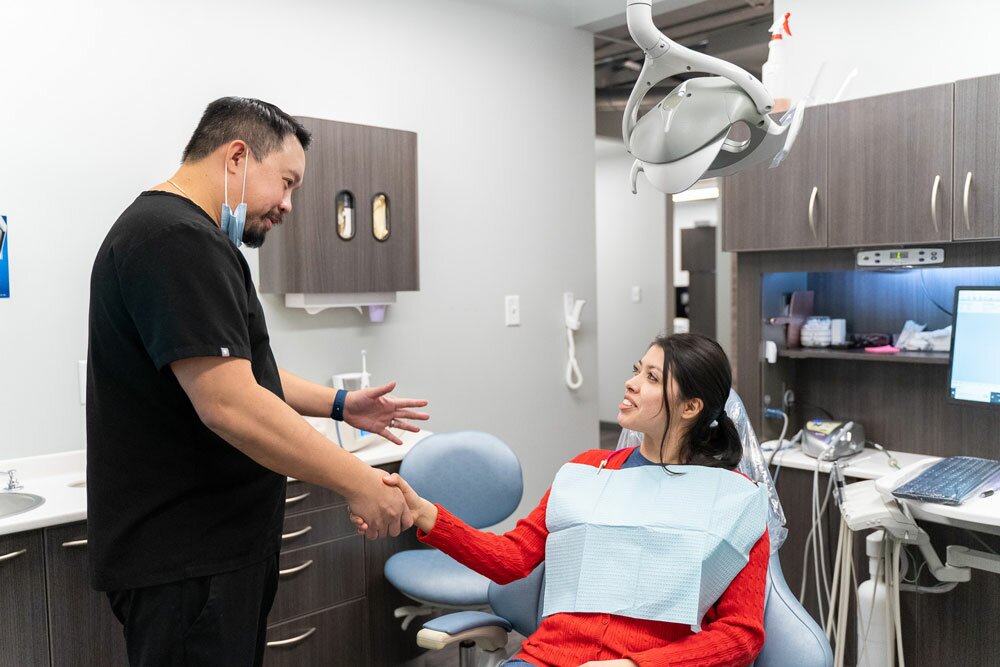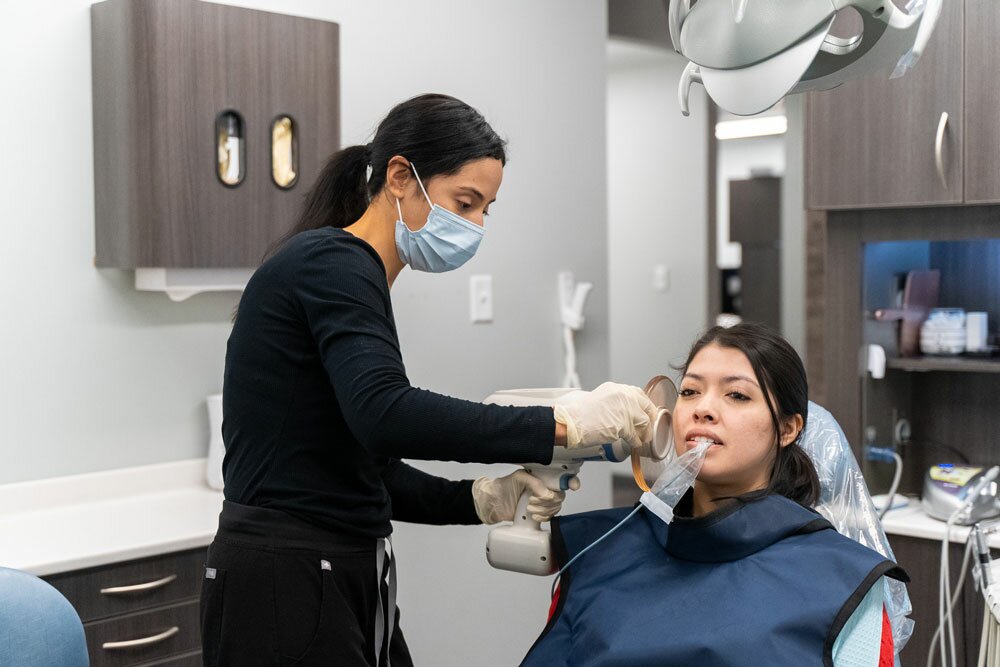Dental implants are widely considered the best replacement for your natural teeth. Unlike most other forms of teeth replacement, dental implants replace the root structures of your missing teeth and not just the visible crowns. Whether you’re missing one, several, or all of your teeth, we offer single tooth implants and full arch dental implants to restore your smile. Our dental implant specialists are committed to helping you achieve a bright and radiant smile in Houston.
What are Dental Implants?
A dental implant is an artificial tooth root placed into your jaw to hold a replacement tooth or bridge. Dental implants may be an option for people who have lost a tooth or teeth due to periodontal disease, an injury, or some other reason. Dental implants are made of titanium or ceramic, biocompatible materials that are well-tolerated by the body. The implant fuses with the jawbone, and this process, called osseointegration, gives implants their strength and stability.
Dental implants can be used to support one or more false teeth. They are most commonly used to support individual crowns (caps) but can also be used to support a dental bridge or denture. A single implant can be used to support a single tooth, and several implants can be placed in the jawbone to support a bridge or denture. If you are considering dental implants, please consult your dentist or oral surgeon to explore your options.
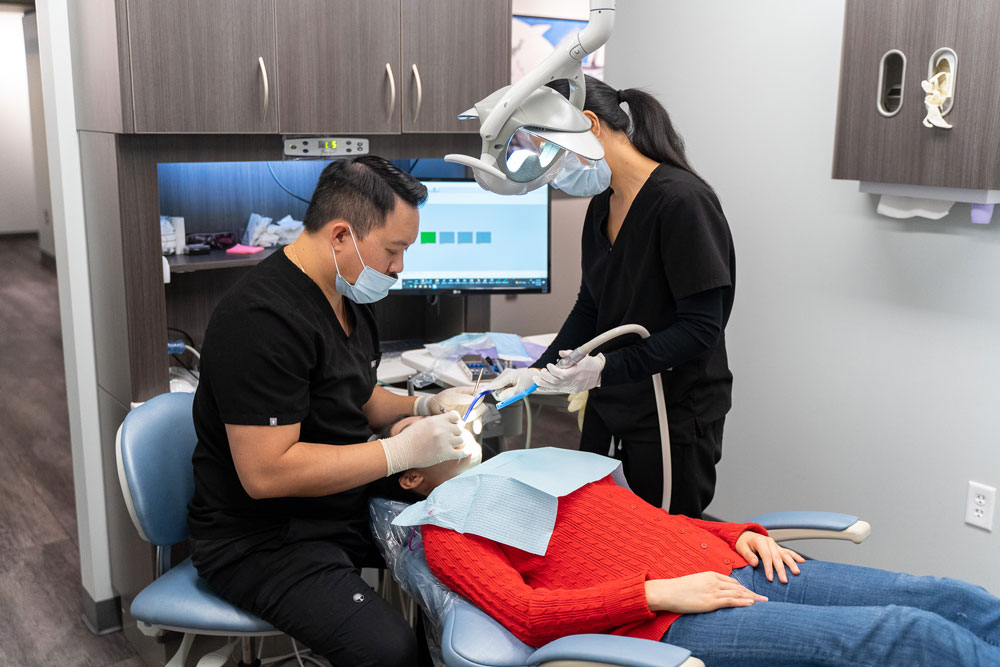
Dental implants allow you to eat, speak, and chew normally. Schedule your appointment with us now.
Single Tooth Implants
A single tooth implant is a small screw that is placed into the jawbone to support a single tooth crown. The screw fuses to the bone over time and becomes a strong foundation for the tooth. The single tooth implant can be used to replace a front tooth, a back tooth, or any tooth in between. Single dental implants look and feel natural, are strong and durable, and can preserve your healthy jawbone.
Are you considering getting dental implants to replace missing teeth?Schedule your dental implant appointment right away.
Full Arch Implants
Full arch implants can support a full set of dentures. Unlike traditional dental implants, which are placed in the jawbone to support individual teeth, full arch implants support an entire arch of prosthetic teeth. Full arch implants, also known as all-on-four implants, typically consist of four implants placed in the jawbone in strategic positions to support a fixed, complete denture, which replaces all of the teeth in the upper or lower jaw.
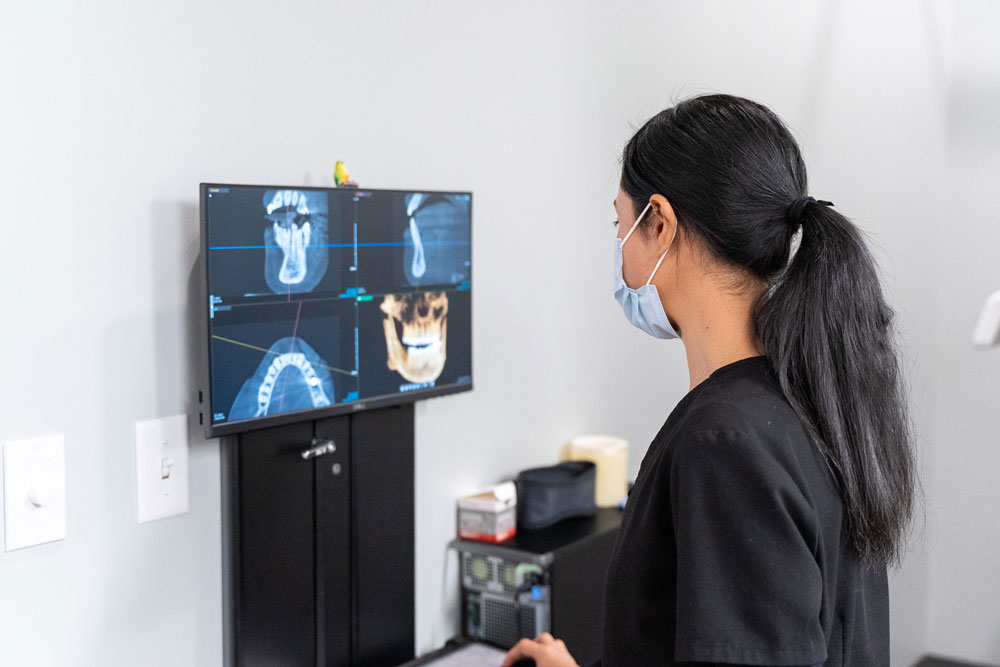
Are you missing a tooth or several teeth? Speak to our dentist to see if dental implants are the right option for you.
Benefits of Dental Implants:
- Improved Appearance: Dental implants look and feel like your own teeth.
- Improved Speech: No worry about teeth slipping or moving when you talk.
- Improved Comfort: Because they become part of you, implants eliminate the discomfort of removable partial or complete dentures.
- Easier Eating. Slipping dentures can make chewing difficult. Dental implants function like your own teeth, allowing you to eat your favorite foods with confidence and without pain.
- Improved Self-Esteem: Dental implants restore your smile and confidence.
- More Conservative: Unlike bridges, implants do not rely on neighboring teeth for support. This means that more of your healthy, natural teeth can be left intact.
- Durability: Implants are very strong and can last a lifetime with proper care.
- Convenience: No special care is required for dental implants. You can brush and floss them just like your natural teeth.
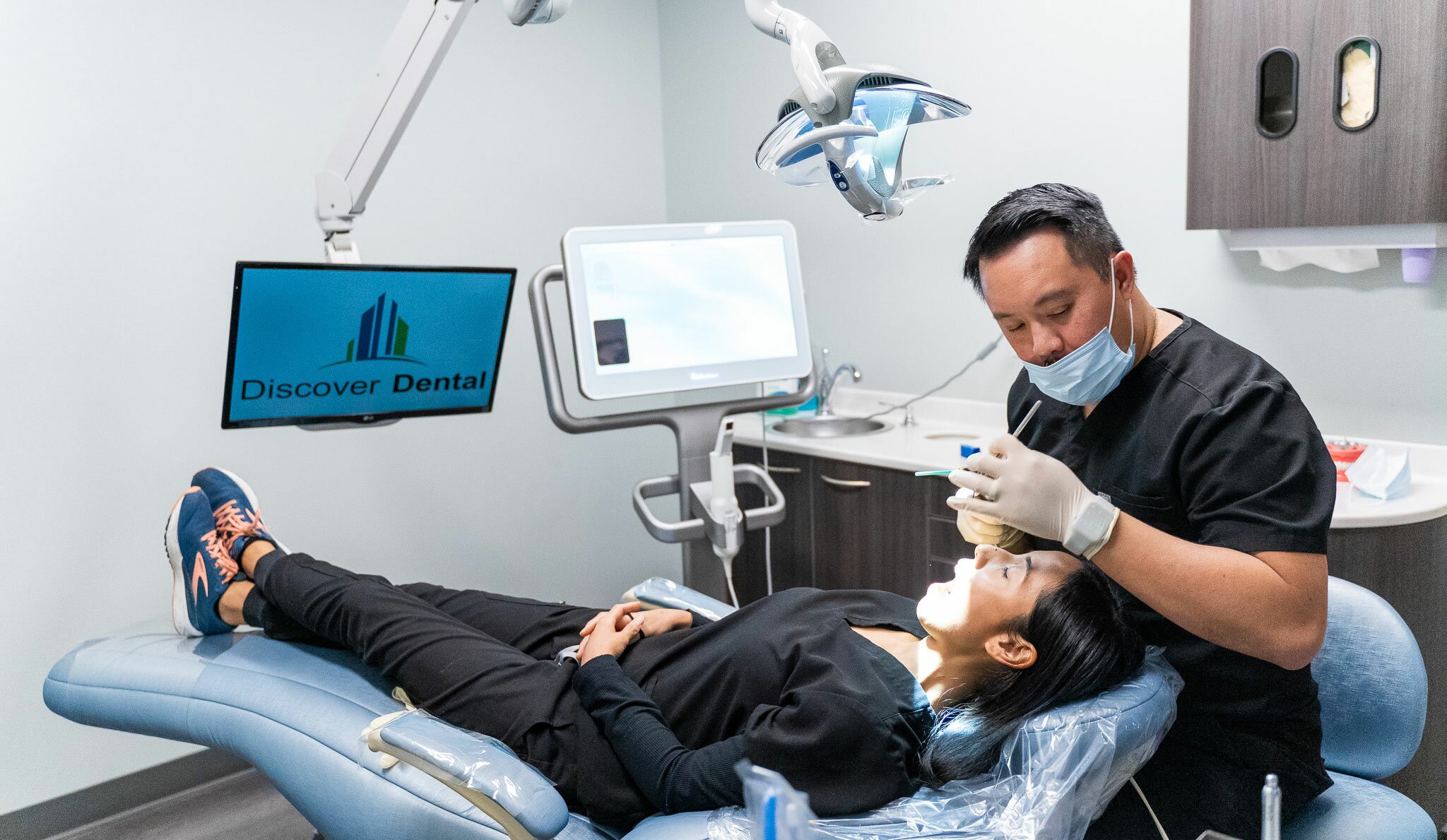
Replace your missing teeth with dental implants. Let us help you restore your smile. Book now.
Dental Implants FAQs
How does full-arch work?
The first step in getting full-arch implants is to consult with an experienced implant dentist. During your consultation, the dentist will assess your dental health and determine whether you are a good candidate for the procedure. If you are deemed a good candidate, the next step is to have a CT scan of your jaw in order to create a 3D model of your jawbone.
Once the 3D model of your jawbone is created, the implant dentist will use this model to plan the placement of the metal posts that will support your full-arch implant. The posts are surgically implanted into your jawbone, and then the metal frame is attached to the posts. The final step is to attach the complete denture to the metal frame.
Am I a candidate for full-arch dental implants?
Are you missing all of your teeth, or are you about to lose all of your teeth? If so, you may be a candidate for full-arch dental implants. Dental implants are a popular and effective way to replace missing teeth, and they can restore your smile. If you are considering dental implants, you will need to consult with a dentist to see if you are a good candidate.
Will my age affect my candidacy for full-arch dental implants?
No, your age will not affect your candidacy for full-arch dental implants. Implants are considered to be safe and effective for people of all ages. The main factor that will affect your candidacy is the condition of your bones and gums.
Will my dental implants function like real teeth?
Yes! Dental implants are designed to function just like your natural teeth. They are securely anchored into your jawbone, so you can eat, speak, and smile with confidence. Plus, with proper care, your implants can last a lifetime.
Do dental implants look natural?
Yes, dental implants can look natural. Most people who have them never even tell anyone that they aren’t their real teeth. The implants are placed in the jawbone, and then a small post is attached to the implant. This post is what the new tooth will be attached to. The tooth is made to look just like your other teeth, and no one will ever be able to tell the difference.
How long does a dental implant procedure take?
The dental implant procedure typically involves multiple steps and can take several months to complete. The length of the procedure can vary depending on factors such as the number of implants needed and the condition of your jawbone. In general, the initial implant placement surgery takes about 1-2 hours per implant. Following this, there is a healing period of several months during which the implant fuses with the jawbone in a process called osseointegration. Once the implant has fully integrated, our dentist will attach a crown or other prosthetic to the implant, which can take an additional 1-2 appointments. Overall, the dental implant procedure can take anywhere from a few months to a year or more, depending on your individual case. Our dentist can provide you with a more detailed timeline based on your specific needs and goals. Book your appointment now!
What is a dental implant made of?
A dental implant usually comprises three parts: the implant post, the abutment, and the crown or prosthetic. The implant post is crafted from biocompatible materials such as titanium or ceramic, which integrate with the jawbone via osseointegration. The abutment is a connector that is affixed to the implant post, and the crown or prosthetic is fastened to the abutment. Porcelain or a comparable material is typically used to construct the crown or prosthetic, creating a natural-looking and functional tooth. Dental implants are a long-lasting, robust solution for missing teeth that can enhance your oral health and overall quality of life. Book your appointment now for a much brighter smile!
What to eat after dental implant surgery?
After dental implant surgery, it’s important to follow our dentist’s instructions on what to eat and drink. In the first few days after surgery, it’s recommended to stick to soft, easy-to-chew foods such as soups, yogurt, mashed potatoes, and smoothies. Avoid hot, spicy, and acidic foods, as well as foods that require a lot of chewing or crunching. It’s also important to stay hydrated by drinking plenty of water, but avoid using a straw, as the suction can dislodge the blood clot and delay healing. As you begin to heal, you can gradually introduce firmer foods into your diet. Remember to chew on the opposite side of your mouth and take small bites to avoid putting pressure on the implant site. By following these guidelines, you can help ensure a smooth and successful recovery after dental implant surgery. Book your appointment now!
What is a mini dental implant?
A mini dental implant is a smaller version of a traditional dental implant that is used to stabilize dentures or replace missing teeth in areas with less available bone. Mini dental implants are typically less than 3mm in diameter compared to traditional implants that are 4-5mm in diameter. They are made of the same biocompatible materials as traditional implants such as titanium or even ceramic, and can be placed in a minimally invasive procedure with less discomfort and a faster recovery time. While mini dental implants may not be suitable for all patients, they offer a viable alternative for those with limited bone density or other conditions that make traditional implants difficult or impossible to place. Book your appointment now at Houston for a healthier and brighter smile!
How to treat infection around dental implant?
Infection around a dental implant is a serious issue that needs to be addressed promptly. Treatment typically involves a thorough cleaning of the area around the implant to remove any debris or bacteria. In some cases, antibiotics may be prescribed to help control the infection. In more severe cases, the implant may need to be removed temporarily to allow for proper healing. If the infection is caught early and treated promptly, the implant can often be saved. However, if left untreated the infection can lead to implant failure and potential bone loss. It is important to maintain good oral hygiene and regular dental check-ups to prevent and detect any potential issues with dental implants. Book your appointment now at Houston!
How is a crown attached to a dental implant?
Attaching a crown to a dental implant typically involves a two-step process. First, an abutment (a small connector) is attached to the implant. The abutment serves as a base for the crown to be attached to. The second step involves attaching the crown to the abutment. The crown is custom-made to match the size, shape, and color of your natural teeth. It is then screwed or cemented onto the abutment, creating a secure and stable attachment to the implant. Our dentist at Houston will ensure that the crown fits properly and feels comfortable before finalizing the attachment process. With proper care and maintenance, a crown attached to a dental implant can last for many years. Schedule your appointment now for a Hollywood smile!
Pain after dental implant how long?
Following a dental implant procedure, it is common to experience some degree of pain and discomfort. The severity and duration of the discomfort may vary from patient to patient. Typically, patients report experiencing mild to moderate pain for several days following the procedure. In some cases, the discomfort may persist for up to two weeks. It is important to note that if the pain is severe, persistent or worsening, you should immediately contact our dentist or oral surgeon, as it may indicate complications or infection. Our highly trained dental professionals at Houston are equipped to offer pain management strategies to mitigate any discomfort, which may include over-the-counter pain relievers or prescription medications. Schedule an appointment with us to discuss any concerns you may have about your post-implant procedure experience!
Schedule Your Full Arch Dental Implants
Discover Dental is pleased to offer single tooth implants and full arch dental implants in Houston. This treatment is ideal for those who have lost all of their teeth due to injury, disease, or decay. Full arch dental implants are a permanent solution that will give you back your smile and your confidence. Schedule a consultation with our dental implant specialist Dr. Tony Tran today to see if you are a candidate for this life-changing procedure.

